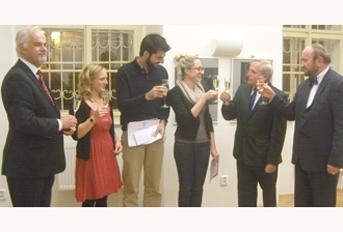Associação Portuguesa de Investigação em Cancro
Portuguese investigator wins 1st prize at the 10th International Medical Postgraduate Conference
Portuguese investigator wins 1st prize at the 10th International Medical Postgraduate Conference

The young investigator Bruno Pereira, from IPATIMUP and in representation of the Faculty of Medicine of University of Porto, was awarded the 1st prize for his presentation at the 10th International Medical Postgraduate Conference 2013, which occurred in Hradec Králové, Czech Republic, and recognized by the Organisation for PhD Education in Biomedicine and Health Sciences in the European System (Orpheus) as the author of outstanding research.
The results focused in the role of the RNA-binding protein MEX3A on the regulation of CDX2 expression and how it impacts processes of intestinal-like differentiation, stemness and polarity. This work was recently published in Nucleic Acids Research (Pereira B. et al. 2013. Nucleic Acids Res. 41:3986-3999).
See more informations here: https://www.lfhk.cuni.cz/Science,-Foreign-Relations/Meetings/International-Medical-Postgraduate-Conferences/10th-International-Medical-Postgraduate-Conference/
Abstract:
Regulation of CDX2 and intestinal differentiation in Homeostasis and carcinogenesis: unveiling the role of the RNA-binding protein MEX3A
Author: Bruno Pereira, Differentiation and Cancer group, Institute of Molecular Pathology and Immunology of the University of Porto (IPATIMUP), Portugal and Faculty of Medicine of the University of Porto (FMUP), Portugal
Co-authors: S. Sousa, R. Barros, L. Carreto, P. Oliveira, C. Oliveira, N. T. Chartier, M. Plateroti, JP. Rouault, JN. Freund, M. Billaud, R. Almeida
The homeodomain transcription factor CDX2 is a key player in intestinal differentiation. Therefore, it is not surprising to find its expression significantly altered in carcinogenic processes of the gastrointestinal tract. Several transcriptional, post-transcriptional and post-translational mechanisms have been described to control CDX2, making this a highly complex and tightly organized regulatory system. Through genome-wide screening of a 3D culture system, the RNA-binding protein MEX3A was identified as putatively involved in CDX2 regulation; therefore, its biological relevance was addressed by setting up cell-based assays together with expression studies in murine intestine. We demonstrate that MEX3A has a repressive function by controlling CDX2 levels in gastric and colorectal cellular models. This is dependent on the interaction with a specific binding determinant present in CDX2 mRNA 3`untranslated region. We have further determined that MEX3A impairs intestinal differentiation and cellular polarization, affects cell cycle progression and promotes increased expression of intestinal stem cell markers. Finally, we show that MEX3A is expressed in mouse intestine, supporting a biological background for the regulation of CDX2. In this study, we provide the first demonstration that MEX3A represses CDX2 expression in the gastrointestinal context, putatively as a translational repressor, with direct implications in key mechanisms for tissue homeostasis that are also inextricably linked with cancer.




